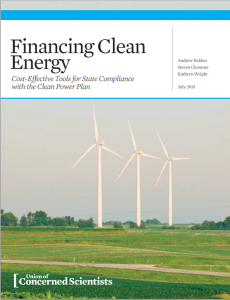Full Title: Financing Clean Energy: Cost-Effective Tools for State Compliance with the Clean Power Plan (2015)
Author(s): Andrew Belden, Steven Clemmer, and Kathryn Wright
Publisher(s): Union of Concerned Scientists
Publication Date: July 1, 2015
Full Text: Download Resource
Description (excerpt):
States can help increase investments in renewable energy and energy efficiency by utilizing “green banks,” institutions that use innovative financing initiatives to assist customers with developing clean energy. This promising avenue for scaling up investments in clean energy is particularly useful in the context of the EPA’s Clean Power Plan, which requires states to reduce carbon emissions from existing power plants. To demonstrate this approach in action, this report highlights the efforts of six state governments (Connecticut, New York, Pennsylvania, Kentucky, Iowa, and Massachusetts) and one national government (Germany) to mobilize public and private capital to strengthen clean energy investment.
To spur investments in renewable energy and energy efficiency, states can adopt a number of proven clean energy market-development mechanisms. The most popular to date include renewable electricity standards, energy efficiency resource standards, public benefits funds, tax and incentive policies, utility rebates, building-energy codes, net metering, and carbon cap-and-trade. In addition, many of the states highlighted in this report have used green banks and other new financing initiatives to help secure funding and scale up clean energy investments without the need for substantial direct incentives. These policies complement the available set of policy options above, and can also help make renewable energy and energy efficiency more competitive, especially as existing policies change, expire, or become less effective.
